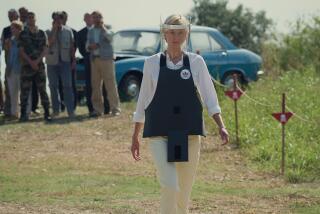Rock ‘n’ roll Victoria
OXFORDSHIRE, ENGLAND — Emily Blunt insists her new movie, “The Young Victoria,” is “definitely not a history lesson. It’s very relatable. She doesn’t get on with her mother. She’s in love for the first time. She’s a teenager. And she’s in a job where she’s in way over her head.”
Slouched in a director’s chair in the cobbled courtyard of Blenheim Palace in Oxfordshire, which is today subbing for London’s Buckingham Place, Blunt is almost unrecognizable as the neurotic magazine assistant she played opposite Meryl Streep in “The Devil Wears Prada.” Her face mostly free of makeup, her hair bundled up in the unflattering style of early 19th century England, Blunt looks uncannily like the teenage Queen Victoria. “Especially when you’ve got the hair like this,” she laughs. “I feel like a bit of a spaniel.”
Written by Julian Fellowes, the Oscar-winning screenwriter of “Gosford Park,” “The Young Victoria” reveals a little-known side of England’s longest-serving monarch -- 63 years and seven months -- whose image has long been that of an aloof, pinch-faced old lady dressed in black with a handkerchief on her head, mourning her husband Prince Albert. “You see pictures of her and she looks so dour and serious,” says Blunt, who plays Victoria from 17, when she was kept under lock and key by her domineering mother, unable to even walk downstairs on her own, through to her coronation in 1837 at 18 and her first, tentative years on the throne. “Her mouth actually kind of goes down, she’s that unhappy.”
Blunt’s Victoria couldn’t be more different: a rebellious, romantic creature who falls in love with and marries her cousin Albert (Rupert Friend), the young German prince whose courtship was arranged by their uncle, King Leopold of Belgium. Victoria and Albert went on to have nine children and preside over huge political, economic and industrial progress in Britain and its empire until Albert’s death at age 42. “He was the love of her life,” notes Blunt, who was allowed access to Victoria’s private diaries and letters and was amazed at how passionate she came across in them. “You can hear her voice when you see her writing, everything’s underlined, she can’t stress things enough. She loved the opera, the ballet, to sing. She would be up to 4 in the morning, dancing, while Albert would be conked out by 11.”
For his part, Fellowes says, what he hopes “the film helps people to understand is the grief, why she was so desperate when he died. She couldn’t trust her own mother, she wasn’t allowed friends, and finally she meets someone who loves her passionately, who supports her, helps her, gives her the wealth of his ideas, who is the perfect lover, who is everything, and then he’s gone. I think it was just terrible for her.”
It was Sarah Ferguson, the Duchess of York and a former member of the English royal family, who approached Oscar-winning producer Graham King (“The Departed”) with the idea of making a movie about Victoria’s early life. “She must have pitched me, like, 25 projects. And right in the middle there was this,” recalls King (making his first film in his native England), who says her royal connections proved invaluable to the production. (Ferguson’s eldest daughter, Princess Beatrice, appears as a featured extra in the coronation scene. “That was quite amazing,” he notes. “This is her family.”)
King was determined that Victoria be played by a British actress and was prepared to cast an unknown if necessary. It wasn’t. Blunt had read Fellowes’ script and was desperate for the role. “She came into my office and said, ‘How do I get this part? I’ll do anything to play this part,’ and she meant it.”
“I thought she was remarkable and such a challenge,” Blunt says. “This young girl, who was so feisty and emotional and strong-willed, was very fascinating to me.” Moreover, Blunt felt she understood her. “In my life and in the job I’ve chosen to do, you have to perform all the time. And I thought Victoria was a bit of an actress.”
To distinguish the film from the gamut of stuffy British period dramas and give it an edgy feel, King hired French-Canadian director Jean-Marc Vallee, whose debut feature, “C.R.A.Z.Y.,” was an ode to English rock ‘n’ roll. Initially, Vallee wasn’t interested. “But when I read the script, I saw it’s a family drama, a romance, a political plot at the same time.” For him, Victoria’s attitude was also very rock ‘n’ roll. “She’s a rebel,” he says. “She has this attitude, which is you make noise, you want to yell and yell loudly to your parents and all the people, to authority. . . . ‘I’m going to do it my way.’ That’s what rock ‘n’ roll is all about. That’s what I liked about her, this energy. [Victoria] was special and had this mystical quality.”
--
More to Read
Only good movies
Get the Indie Focus newsletter, Mark Olsen's weekly guide to the world of cinema.
You may occasionally receive promotional content from the Los Angeles Times.










